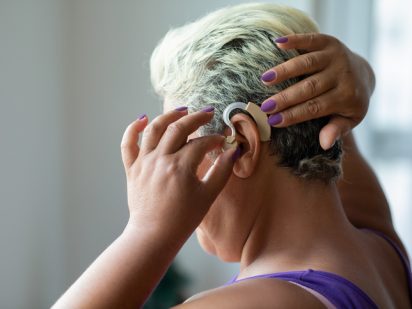In October, a new Food and Drug Administration (FDA) rule officially cleared the way for hearing aids to be sold over the counter without a prescription. Under the FDA’s regulations, people with mild to moderate hearing loss can now buy hearing aids in retail stores and online without being required to see a doctor for an exam to get a prescription. The change also eliminates the requirement to see an audiologist for a hearing examination and fitting.
“The new rule applies to adults ages 18 and older with mild to moderate perceived hearing loss,” said Tricia Nechodom, AuD. “The problem, though, is that most hearing loss is gradual and occurs over a period of time, so someone might think they have mild hearing loss, but when tested may register as having moderate to severe hearing loss.”
People with mild hearing loss may struggle to hear sounds like dripping water, whispered conversations or birds chirping. They often say they hear well in quiet environments when talking one-on-one with someone; however, not so well when they are in noisy environments, or when a person is facing away from them.
About 30 million Americans experience hearing loss, but only 20% of them get help. Research shows that untreated hearing loss can contribute to isolation, depression, cognitive decline and dementia in older people.
Generally, people who discover a hearing loss wait an average of seven years to seek help with hearing aids. Nechodom says that as the hearing loss progresses, the brain compensates, or “maladapts,” to try to hear sound properly. People who delay treatment over long periods of time become less able to understand speech over time. “Catching a hearing loss when it is mild gives you the best chance for success for hearing clearly with hearing aids and rehabilitation, because the maladaptive compensation processes in the brain are able to be reversed,” she said.
Over-the-counter (OTC) hearing aids will be available to purchase at Keycare Pharmacy, B&B Northwest Pharmacy and Trinity Health Audiology department in early January. After a thorough vetting process, Nechodom settled on two devices she felt offered proper sound quality and cosmetic appeal at a fair price.
“The first hearing aids sent to us weren’t the quality I’d hoped for; they had a lot of internal noise, very little ability for the patient to adjust the settings and the overall sound quality was very poor, so we sent them back,” she said. “The hearing aids I chose come from reputable companies and sell for a fair price, ranging from $800-$1000 per set. I’ve been testing over-the-counter hearing devices for five years and the testing process makes me realize you get what you pay for,” Nechodom said.
Nechodom believes those who have recently acquired mild hearing loss are better equipped for OTC hearing aids because their brains haven’t changed as much. “Those are the patients I see as being very successful,” she added.
If you try an OTC device and still experience symptoms of hearing loss, consider an evaluation by an audiologist. Nechodom says that many companies who have tried making OTC hearing devices run into a common problem: they think treatment is as simple as wearing a hearing aid to solve all communication difficulties.
“Many manufacturers don’t understand how hearing loss is a neurodegenerative disorder that affects the brain. It takes work, practice and counseling to get used to a hearing aid because patients are at different points in their hearing loss journey, so everyone’s brain is affected differently,” Nechodom said. “A hearing aid will not solve all the problems for patients who have had hearing loss for 20 or 30 years,” she added.
Trinity’s Audiology team also offers the 5 Keys Communication hearing rehabilitation program to patients and their loved ones. “Our hearing care is designed to go beyond the hearing test and hearing aids. Our goal is to teach communication strategies using methods that are easy to understand and incorporate into your daily life,” she added.
People with more severe hearing difficulties may need prescription aids or other interventions. These are people who have difficulty hearing even in quiet environments and struggle to hear loud noises, like car engines or construction equipment. If you are experiencing these symptoms, or a ringing in your ears, hearing loss in only one ear, a sudden onset of hearing loss, vertigo, pain, or fluid leaking from your ears, you should seek medical attention.
Trinity Health Audiology offers a full range of clinical services for pediatric and adult patients with hearing disorders and auditory problems. Call 701-857-5986 for more information or to make an appointment.

